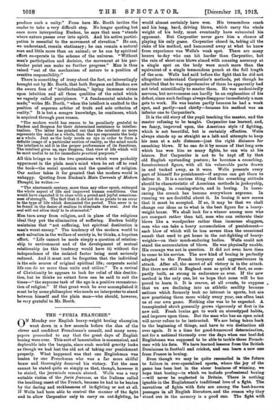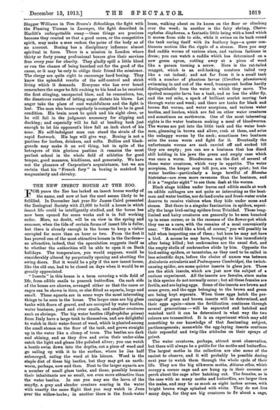THE " FURIA. FRANCESE."
ON Monday our English heavy-weight boxing champion went down in a few seconds before the Elan of the clever and confident Frenchman's assault, and many news- papers proceeded to say that the great days of English boxing were over. This sort of lamentation is nonsensical, and deplorable into the bargain, since such morbid gravity looks as though we had lost the old art of taking our punishment properly. What happened was that one Englishman was beaten by one Frenchman who was a far more skilful boxer and thoroughly deserved his victory. Yet the case cannot be stated quite so simply as that, though, however it be stated, the jeremiads remain absurd. Wells was a very suitable victim of the furia francese, as the Italians called the headlong onset of the French, because he bad to be beaten by the daring and recklessness of in-fighting or not at all. If Wells had been able to control the manner of the fight and to allow Carpentier only to carry on out-fighting, he
would almost certainly have won. His tremendous reach and his long, bard, driving blows, which carry the whole weight of his body, must eventually have exhausted his opponent. But Carpentier never gave him a chance of playing his only game. Carpentier closed in, taking all the risks of his method, and hammered away at what he knew from experience was Wells's weak spot. There are many boxers to-day who can hit harder than Carpentier, but the rain of short-arm blows aimed with amazing accuracy at a single spot on the body were much more than the equivalent of a single tremendous punch at the full length of the arm. Wells had said before the fight that he did not altogether understand Carpentier's methods, yet though he admitted that he was apprehensive of them he apparently had not tried scientifically to master them. He was undoubtedly nervous, but nervousness can hardly be an explanation of his defeat, since such feelings always disappear immediately a man gets to work. He was beaten partly because he had a weak spot, and partly—and chiefly—because his method was an inferior one to Carpentier's.
It is the old story of the pupil teaching the master, and tho master refusing to be taught. Carpentier has learned, and, we fancy, improved upon, the American style f fighting, which is not beautiful, but is certainly effective. Wells always stands up as straight as a lath and attempts to keep his man at a safe distance—just the right distance for smashing blows. If he can do it by means of that long arm which has won him so many fights, he can win at his leisure. But Carpentier is not to be kept off by that old English upstanding posture; he becomes a crouching, foreshortened figure, with all his vulnerable parts drawn in and tucked away, as it were. Wells presents every part of himself for punishment—if anyone can get there to deliver it. It is a curious thing that the crouching attitude should be characteristic of American methods in jockeyship, in jumping, in running-starts, and in boxing. In horse- racing the crouch has become everywhere supreme. In running we are doubtful about it. In boxing it now seems that it must be accepted. If so, it may be that we shall change our ideas as to what is the best figure for a heavy- weight boxer. We shall look for a winner among men who are compact rather than tall, men who can reiterate their blows like a woodpecker rather than immense sloggers, men who can take a heavy accumulation of punishment— each blow of which will be less severe than the occasional smash that used to get home in the out-fighting of heavy- weights—on their much-enduring bodies. Wells could not stand the accumulation of blows. He was physically unable. His courage was not in question. It did not even have time to come to his service. The new kind of boxing is perfectly adapted to the French buoyancy and aggressiveness in attack. After all, the secret of all victory is in the attack. But there are still in England men as quick of foot, as com- pactly built, as strong in endurance as ever. If the new method is the only one, let us hope that none will be too proud to learn it. It is craven, at all events, to suppose that we are declining into an athletic senility because nations which formerly took no interest in sports, but are now practising them more widely every year, can often beat us at our own game. Nothing else was to be expected. A transplanted shrub generally grows vigorously at first in its new soil. Fresh brains get to work on stereotyped habits, and improve upon them. But the man who has an open mind. will never refuse to be instructed. We are being taken back to the beginning of things, and have to win distinction all over again. It is a time for good-humoured determination, not for a national threnody over the days when one beef-fed. Englishman was supposed to be able to tackle three French- men with his fists. We have learned lessons from the British Dominions in football and cricket, and can learn a new one from France in boxing.
Even though we may be quite reconciled in the future to failure in over-specialized sports, where the joy of the game has been lost in the sheer business of winning, we hope that boxing—in which we include professional boxing —will never be neglected in Britain. There is nothing ignoble in the Englishman's traditional love of a fight. The narratives of fights with fists are among the best-known passages in all English literature, and the reason why they stand out in the memory is a good one. The fight with Slogger Williams in Tom, Brown's Schooldays, the fight with the Flaming Tinman in Lavengro, the fight described in Hazlitt's unforgettable essay—these things are precious because they remind us that a good cause, or the competitive spirit, may make a man reckon the pains of the body as of no account. Boxing has a disciplinary influence almost spiritual in force. There is a mission in London where thirty or forty young professional boxers give their services free every year for charity. They gladly spill a little blood or run the chance of being knocked out for the good of the cause, or it may be only to oblige their friend the missioner. The clergy are quite right to encourage hard boxing. They know the splendid results of the self-control and strict living which it demands. Everyone who has ever boxed remembers the anger he felt rushing to his head as be received the first stinging, unexpected blow, and he remembers, too, the disastrous results of letting anger dictate his blows. Let anger take the place of cool watchfulness and the fight is lost. The man who boxes regularly is compelled to be in good condition. His brain must be quick and his sight clear, or be will fail in the judgment necessary for slipping and ducking; and especially will be fail at bending back just enough to let his opponent's blow fall an inch short of his nose. No self-indulgent man can stand the strain of the rapid footwork. His legs will give way. Boxing is not a pastime for loafers, drinkers, and softs. Bullies and black- guards may make it an evil thing, but in spite of the betrayers of this glorious pastime it remains the most perfect school in the whole field of athletics for good temper, good manners, kindliness, and generosity. We have not the pleasure of Carpentier's acquaintance, but we are certain that his "French fury " in boxing is matched by magnanimity and chivalry.



























































 Previous page
Previous page